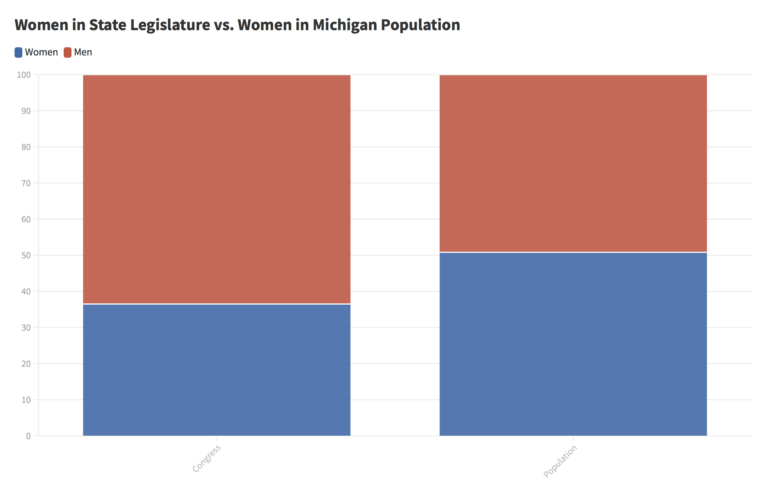By SOPHIA LADA
Capital News Service
LANSING — Samantha Steckloff first ran for political office when she was 28 years old.
Some constituents didn’t think she would know what was going on in the community because she was unmarried and had no children.
“You get to the point where you know you’re going to get ignored, you know you’re going to be asked these questions and it’s just frustrating,” she said.
Now, Steckloff, who can’t have children because of chemotherapy, is a state representative from Farmington. And she’s working on a women’s health bill about breast cancer screenings and reproductive rights.

Sophia Lada
Women in Legislature vs. Women in Michigan population.However, with only 36.5% of the Legislature being women, she said she often finds herself lobbying male colleagues who are uncomfortable talking about these topics.
There is only one state legislature with a majority of women – Nevada, according to Rutgers University’s Center for American Women and Politics.
In Michigan, men make up 49% of the population and hold 63.5% of seats in the state House and Senate.
There are 10 female senators, seven Democrats and three Republicans, and 42 representatives, 27 Democrats and 15 Republicans.
Steckloff said she’s excited because this year is the first time women outnumber men in the House Democratic caucus.
And she said a huge voice is missing when one party moves toward equality and the other doesn’t.
When working on bills about women’s health, there often are not enough women on the other side of the aisle to get anything passed, she said.
Rep. Brenda Carter, D-Pontiac, agreed with Steckloff that women should be better represented in the Legislature.
Even though she is African American, she said she’s encountered more bias in her career based on her sex than on her race.
“We need a voice,” Carter said. “We need to be able to articulate to the people who represent us our values as women.”
Carter, who just began her second two-year term, said the Legislature has passed two of her bipartisan bills since the start of her tenure in the Capitol.
Carter said that one of the most influential programs for her legislative success was the Michigan Political Leadership Program that provides issue and policy education, professional development and advice on how to campaign and govern.
Matt Grossmann is the director of the Institute for Public Policy and Social Research at Michigan State University, which runs the program.
Grossmann said women are more likely to have fundraising concerns, more likely to sponsor bipartisan bills and are more effective in passing legislation than men.
He said the program selects participants who are interested in state and local offices and has about 600 alumni, more than half of whom work in state or local offices.
This program is important because it empowers women and minorities to run for political office, he said.
There are also national groups that work to elect women specifically, such as EMILY’s List and the Susan B. Anthony List.
EMILY stands for “early money is like yeast” to explain how early donors to a campaign can help attract more donors later.
The organization was founded to elect pro-choice Democratic women and is now the largest national resource for women in politics, according to its website.
“It is important that the government looks like those that they govern,” said, Ben Ray, the senior director of campaign communications at EMILY’s List. And he says women legislators are more effective and productive than their male counterparts.
The Susan B. Anthony List is on the opposite end of the American politics ideological spectrum and raises money to elect pro-life women. Prudence Robertson, the organization’s communications associate, declined an interview.
Sometimes it’s a question of attitude, female lawmakers say.
Rep. Cynthia A. Johnson, D-Detroit, said male colleagues have told her to be “more like a lady.”
She said a big issue is that some women define their self-worth by what their husbands say.

Sophia Lada
The Capitol in Lansing.Johnson said she wishes women would see their power and know that they can do anything.
“It hurts the whole of us when we see other women being browbeat into believing that overall men have that superiority,” she said.